Published: 19 April 2018
Demand for accommodation services rose to record figures in 2017
In 2017, accommodation establishments in Finland had a record number of nearly 22 million overnight stays, of which domestic tourists accounted for around 15.2 million and foreign tourists for good 6.7 million. The foreign demand for accommodation services grew by 16.8 per cent and the domestic demand by 4.1 per cent compared with the previous year. In all, total demand for accommodation services grew by 7.7 per cent in 2017.
The target group of the accommodation statistics has been reviewed and a few accommodation establishments operating in the industries of hotels and hostels were added to it starting from data concerning January 2017. The effect of the review is around 2.5 per cent of the total number of overnight stays from 2017 onwards. Because of the review, the data starting from 2017 are not fully comparable with those for earlier years.
The demand for accommodation services made a clear upturn in 2016 that continued as strong in 2017. Demand grew in every month of the year. In May and June, growth was around eight per cent, in February and April around nine per cent, and in November ten per cent. The biggest growth percentages came in December and January when growth amounted to as much as 12 to 13 per cent compared to 2016. In the remaining months, the demand for accommodation services grew by four to seven per cent. These figures are data from Statistics Finland’s statistics on accommodation establishments and they have been collected from accommodation establishments with at least 20 beds or caravan pitches with electricity connection.
Year-on-year changes in nights spent (%) by month 2017/2016
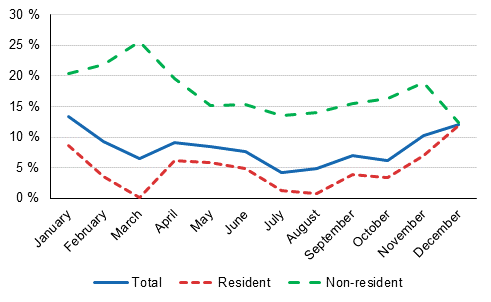
Russians still formed the largest group of foreign visitors in accommodation establishments in 2017
Russians were still the largest group of foreign tourists in Finnish accommodation establishments in 2017. Nearly 822,000 overnight stays were recorded for Russians, which was 17.8 per cent more than in the year before. The share of Russians among all overnight stays by foreign tourists remained at 12 per cent in 2017 just like in 2016. Germans came second with some 623,000 overnight stays. Their overnight stays increased by 15.3 per cent year-on-year. Swedish and British visitors came next after Germans. For Swedish and British visitors, the number of overnight stays was just shy of 600,000 for both. The number of nights spent by Swedish tourists grew by 8.7 per cent and nights spent by British tourists by 17.0 per cent compared to 2016.
Among the most important countries of inbound tourism to Finland, the biggest growth percentage came from China, 35.3 per cent. Altogether, 313,000 overnight stays were recorded for Chinese tourists, which made them the fifth largest group after British tourists. Overnight stays recorded for French visitors increased by 12 per cent and totalled 280,000. Visitors from the United States spent 16 per cent more nights in Finland and their overnight stays amounted to 270,000. Overnight stays by Japanese tourists increased by 11.1 per cent and they had around 238,000 overnight stays in 2017. Estonian tourists had nearly 220,000 overnightings and Norwegian visitors slightly under 200,000. Overnight stays by Estonian visitors increased by 13.5 per cent, and those by visitors from Norway by 10.2 per cent. Travelling to Finland from all the major tourist countries grew clearly in 2017.
Examined by continent, Asia exceeded the one million mark for overnight stays for the first time in 2017. Overnight stays by Chinese and Japanese tourists covered slightly more than one-half of the stays by Asians and pushed the overnight stays to a growth of nearly 23 per cent. In total, Finnish accommodation establishments recorded nearly 1.1 million overnight stays for visitors from Asia, surpassing the Nordic countries from where 930,000 overnight stays were recorded. In all, 16.9 per cent more overnight stays were recorded for visitors from EU countries than in 2016, while the number of nights rose to close on 3.6 million. Tourism from America increased by 14.5 per cent and overnight stays amounted to almost 379,000. After the small drop in 2016, tourism from Africa made a 17 per cent upturn in 2017 and around 28,000 overnight stays were recorded for visitors from Africa.
Change in overnight stays 2017 / 2016, %
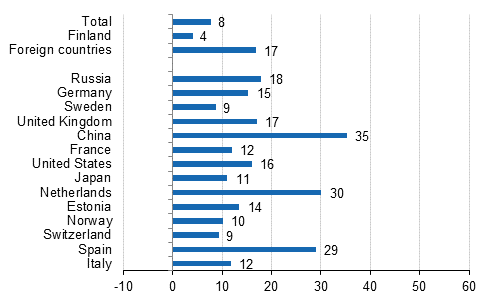
Number of nights spent at hotels totalled almost 17.5 million in 2017
In 2017, the total number of nights spent at hotels was almost 17.5 million, which was seven per cent higher than in 2016. In total, 11.8 million overnight stays were recorded for resident tourists and close on 5.7 million for non-resident tourists. The overnight stays of resident visitors increased by 3.6 per cent and those of non-resident visitors by 14.9 per cent from 2016. Overnight stays at hotels covered almost 80 per cent of all overnight stays at accommodation establishments. The share of foreign tourists of overnight stays in hotels was 32 per cent and 31 per cent of all overnight stays at accommodation establishments.
The occupancy rate of hotel rooms for the whole country was 55.9 per cent in 2017. One year earlier, it was 54.0 per cent. The average price of a hotel room has been growing since 2011, when the average price was EUR 88. In 2017, the average price of a hotel room was EUR 101.
Hotel room occupancy rate and the monthly average price in 2016 and 2017
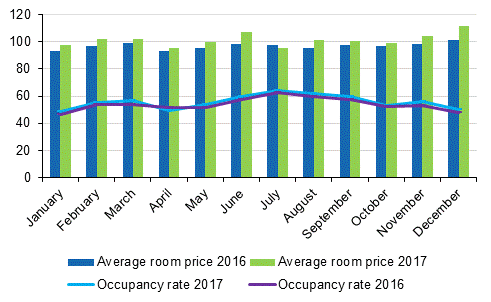
Regional development of overnight stays in 2017
In Mainland Finland, the growth in overnight stays was in 2017
biggest in Uusimaa, where 17.1 per cent more overnight stays were
recorded than in 2016. In Satakunta and Lapland, overnight stays
increased by nine to ten per cent. In Pirkanmaa and South Karelia,
overnight stays increased by some seven per cent and in
Varsinais-Suomi, Päijät-Häme and North Ostrobothnia by around six
per cent in each. In Uusimaa, Satakunta and Lapland, the capacity
of accommodation establishments grew somewhat, while in Pirkanmaa
and South Karelia, the capacity diminished. In addition, overnight
stays increased by five per cent in Kymenlaakso and by around three
per cent in Pohjois-Savo and Central Finland. In the regions of
Etelä-Savo and Ostrobothnia, overnight stays remained almost on
level with the previous year. In all other regions, the numbers of
overnight stays went down last year. The biggest drop in overnight
stays was recorded in the region of Central Ostrobothnia, 7.3 per
cent. In South Ostrobothnia, overnight stays decreased by 3.7 per
cent and in Kanta-Häme by 2.5 per cent. In Kainuu, 1.6 per cent
fewer overnight stays were recorded than in 2016.
In Åland, overnight stays decreased by 0.6 per cent from the year
before.
In absolute numbers, overnight stays in accommodation establishments increased most in Uusimaa, where nearly 940,000 more overnight stays were recorded, and in Lapland, where overnight stays grew by 242,000 from 2016.
In Mainland Finland, the share of overnight stays by foreign visitors in all overnight stays was 47 per cent in the region of Uusimaa, and 51 per cent in Lapland. In South Karelia, the share of foreign visitors was nearly 33 per cent and in Etelä-Savo and Ostrobothnia some 22 to 24 per cent. In Päijät-Häme, Kymenlaakso and Varsinais-Suomi, the shares were 19 to 20 per cent. In Uusimaa, Russians barely managed to maintain their top position among all tourists. Accommodation establishments recorded around 259,000 overnight stays for them. In Lapland, the biggest group of foreign visitors were British tourists for whom nearly 274,000 overnight stays were recorded. In South Karelia, Etelä-Savo, Päijät-Häme and Kymenlaakso, Russians were the biggest group of foreign tourists while in Ostrobothnia, Swedes took the first position. In Varsinais-Suomi, Swedish and German visitors shared the first place.
Change in overnight stays by region 2016/2015,%
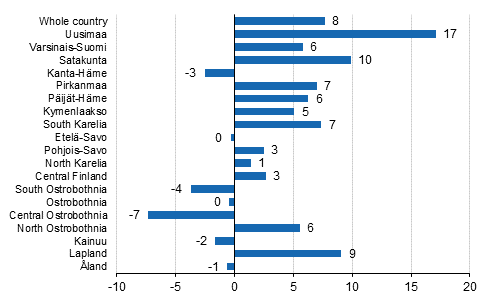
Overnight stays by foreign visitors grew in Finland by more than double compared to elsewhere in Europe in 2017
In 2017, overnight stays by foreign visitors in Europe grew by 6.7 per cent. The 16.8 per cent growth in overnight stays by foreign visitors in Finland was exceptionally high compared to other European countries. In our neighbouring regions, the Nordic and Baltic countries, overnight stays by foreign visitors increased by 4.6 per cent, in Central Europe, the growth amounted to 7.5 per cent and in Southern Europe to 6.2 per cent. In Europe, overnight stays by foreign visitors have grown for the past eight years by an average of 5.3 per cent per year. In Finland, the development of overnight stays by foreigners was negative in 2014 to 2015.
In a long-term examination of overnight stays by foreign visitors starting from 2004, Finland surpassed Central European countries in 2017. Overnight stays by foreign visitors in the Nordic and Baltic countries and in Southern European countries have, however, grown faster than overnight stays in Finland in the long term.
Nights spent by non-residents in Europe (2004 = 100)
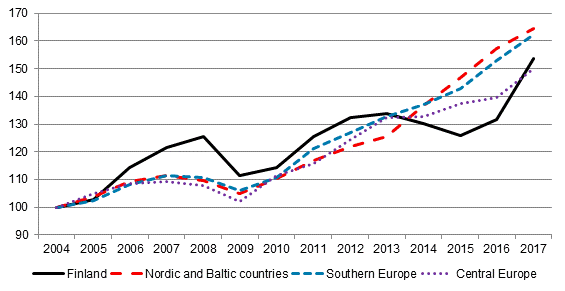
Domestic overnight stays grew in Finland at the same rate as in other European countries in 2017
Domestic overnight stays grew in Finland by 4.1 per cent and in Europe by 3.6 per cent in 2017. The growth in domestic overnight stays was especially modest in our neighbouring regions, the Nordic and Baltic countries, where the growth in domestic overnight stays remained at 0.6 per cent. In Central Europe, domestic overnight stays grew by 3.7 per cent and in Southern Europe by 4.0 per cent.
The information on overnight stays in other European countries is based on monthly data on the use of capacity at European accommodation establishments collected by Eurostat.
Nights spent by residents in Europe (2004 = 100)
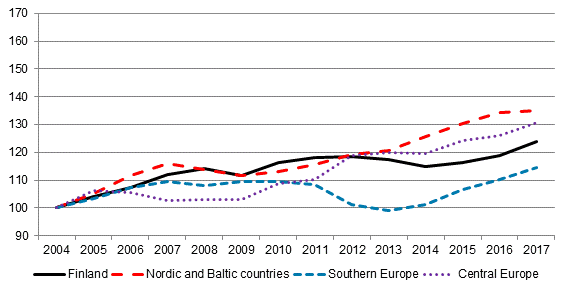
Number of accommodation establishments went up in 2017
In 2017, Statistics Finland’s register of accommodation establishments has been updated with new and closed establishments throughout the year. The target group of the accommodation statistics has been reviewed and a few accommodation establishments operating in the industries of hotels and hostels were added to it. The number of accommodation establishments contained in the statistics grew by 15 in 2017. The room capacity increased by 3,080 rooms and the number of beds by 7,610 beds. The capacity grew in hotels, while in camping sites and other accommodation establishments, apart from hostels, the number of establishments, rooms and beds went down compared with 2016.
In 2017, the statistics covered a total of 1,383 accommodation establishments: 672 hotels, 115 guest houses, 320 holiday villages, 226 camping sites and 50 hostels. Holiday villages of hotel calibre are included in hotels. The accommodation establishments had 68,834 rooms (or cottages) with a total of 170,092 beds. In addition to the room and bed capacity, the accommodation establishments had 20,253 caravan pitches with electricity connection, 15,623 of which were located at camping sites.
When the capacity of accommodation establishments is viewed according to the number of rooms, the statistics contained 1,000 establishments with fewer than 50 rooms and 383 establishments with at least 50 rooms in 2017. Measured by bed capacity, there were 927 establishments with fewer than one hundred beds and 456 establishments with at least one hundred beds.
In 2017, there were 1,103 accommodation establishments that were open year round and 280 establishments that were open part of the year; these were mostly camping sites and holiday villages.
Source: Accommodation Statistics. Statistics Finland
Inquiries: Marjut Tuominen 029 551 3556, Ossi Nurmi 029 551 2984, liikenne.matkailu@stat.fi
Director in charge: Sami Saarikivi
Publication in pdf-format (525.2 kB)
- Tables
-
Tables in databases
Pick the data you need into tables, view the data as graphs, or download the data for your use.
Appendix tables
- Appendix table 1. Capacity and its utilization in 2017 (19.4.2018)
- Appendix table 2. Nights spent in all establishments in 2017 (19.4.2018)
- Appendix table 3. Hotel capacity and capacity utilization in 2017 (19.4.2018)
- Appendix table 4. Nights spent in hotels in 2017 (19.4.2018)
- Appendix table 5. Visitor arrivals and nights spent by country of residence in 2017 (19.4.2018)
- Appendix table 6. Nights spent in all establishments by month in 2017 (19.4.2018)
- Appendix table 7.1. Nights spent by non-residents and annual change (%) in all establishments in 2017 (19.4.2018)
- Appendix table 7.2. Nights spent by non-residents and annual change (%) in all establishments in 2017 (19.4.2018)
- Appendix table 8.1. Nights spent by non-residents and annual change (%) in hotels in 2017 (19.4.2018)
- Appendix table 8.2. Nights spent by non-residents and annual change (%) in hotels in 2017 (19.4.2018)
- Appendix table 9.1. Capacity of accommodation establishments and capacity utilization by type of establishment in 2017 (19.4.2018)
- Appendix table 9.2. Capacity of accommodation establishments and capacity utilization by type of establishment, May-August 2017 (19.4.2018)
- Appendix table 10.1. Capacity of accommodation establishments by type of establishment in 2017 (19.4.2018)
- Appendix table 10.2. Capacity of accommodation establishments by opening season in 2017 (19.4.2018)
- Appendix table 10.3. Capacity of accommodation establishments by number of bed-places in 2017 (19.4.2018)
- Appendix table 10.4. Capacity of accommodation establishments by number of rooms in 2017 (19.4.2018)
Updated 19.4.2018
Official Statistics of Finland (OSF):
Accommodation statistics [e-publication].
ISSN=1799-6325. 2017. Helsinki: Statistics Finland [referred: 17.2.2026].
Access method: http://stat.fi/til/matk/2017/matk_2017_2018-04-19_tie_001_en.html

